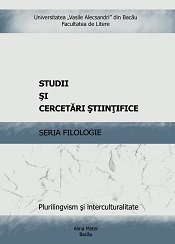Alegerile comparatistului: pentru o cale dincolo de ideologie
The choices of the comparatist: for a path beyond ideology
Author(s): Mariana BaloşescuSubject(s): Studies of Literature, Comparative Linguistics, Theory of Literature
Published by: Editura Alma Mater
Keywords: comparatism; mentality; humanism; inner man; consciousness; memory; morality;
Summary/Abstract: The paper is an essay about my personal experience in the field of comparative literature – research and teaching. I entered this territory through my doctoral research, dedicated to the identification of an epistemological model, as a dominant pattern in the European modernist novel. During my doctoral research, I learned that philosophy can be a productive, even mandatory, way of analyzing aesthetic-literary modernity, but insufficient. I naturally sought to reposition myself in relation to literature, in such a way as to capitalize and continue the experience acquired through the instrumentalization of philosophy, in the understanding of literature. The context in which the text is born, the thinking of the era, the history, the protoplasmic flow between person and society, in the space where the writer creates, have become an important target in building an own method in the practice of comparatism. This is how I moved towards assuming the mentality, as the main context, as a real and unreal place, where the literary text appears and where it then lives its existence and influence. In search of an anchor and a solution, in search of another hermeneutic foundation, which would help the recognition, valorization and identification of the presence of the person, memory and consciousness in the text, I first turned to the Socratic teaching, to Socrates of Socrates, from the Defense..., and to Plato's Socrates, from the Dialogues, in order to understand what connection still exists between today's modernity and the Greek origin that it so vehemently still claims. Then I discovered Christian philolocal thinking, patristic thinking, Saint Paul and Saint Augustine (De Magistro, Confessions). There I found the energy, inspiration and legitimation to develop a hermeneutic practice centered on revealing the inner man revealed in the text, precisely in the encounter between the author's consciousness and that of the reader (hermeneutic), through textual consciousnesses. And I see the inner man as a projection of the person's memory, organized especially in an ethical imaginary translated by the textual consciousness both through language and through the acts, scenarios, and choices evoked. So, the dominant ideas with which I ended up working are in a circle of the person: inner man, memory, conscience, morality. Hermeneutics, in this vision, can no longer be self-sufficient and serve a free interpretation, oriented towards itself, in an internal logic of the type – interpretation for the sake of understanding the text, interpretation for the sake of the logic of language, interpretation in order and discursive autonomy, etc.
Journal: Studii și cercetări științifice. Seria filologie
- Issue Year: 2022
- Issue No: 47
- Page Range: 83-94
- Page Count: 12
- Language: Romanian

